The End of the Middle Ages (1400 - 1500) and the ballad
By Carl Muller
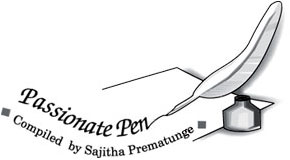 The century that followed the death of Chaucer was a barren one. It
was also a period of civil war with York and Lancaster fighting to
secure the throne. The century that followed the death of Chaucer was a barren one. It
was also a period of civil war with York and Lancaster fighting to
secure the throne.
This “War of the Roses” brought the land to a state of near anarchy.
But in spite of such disadvantages, the 15th century produced ballads -
one of the most agreeable forms of literature. Ballads are narrative
poems, mostly the work of unknown authors. They are sung and handed down
by oral tradition.
Coleridge told us of “the grand old ballad of Sir Patrick Spens.”
Wordsworth called Robin Hood “the English ballad singer’s joy,” and
Alice Greenwood told us of Malory, “who reached out to Chaucer with one
hand and to Spenser with the other.”
In 1765, Bishop Percy printed a collection of ballads under the title
Reliques of Ancient English Poetry. The illustration, is of the title
page of the first edition that consisted of old heroic ballads, songs
and pieces of old lyric poetry. The book was printed by Macmillan
Company in 1765, and the picture I have reproduced, shows a harp, arches
in an outdoor scene, and pages of poetic manuscripts.
Between 1892 and 1898, F.J. Child also published, in five volumes, a
collection of 305 ballads and 1,300 versions, titled English and
Scottish Popular Ballads.
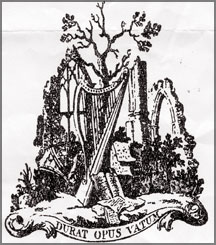
The poems dealt with border warfare, the sea and seamen, life under
the greenwood tree (particularly the songs of the adventures of Robin
Hood), tragedy, comedy and love. They tell of the open air, the wind and
the sunshine, and they were certainly the most attractive of the English
poems.
Longfellow imitated the ballad style in his “Skeleton in Armour” and
Coleridge in “The Rime of the Ancient Mariner”. Let me give you the
opening verses of two well-known ballads. “The Twa Corbies” and “Sir
Patrick Spens”.
As I was walking all alane,
I heard Twa Corbies making a mane;
The Tane unto t’other say,
‘Where sall we gang and dine today?’ Taking the words in italics, I
give you: alane - alone; Twa Corbies - Two crows; mane - moan; The tane
- The one; sall -shall; and gang - go.
The King sits in Dumferline town,
Drinking the blude-red wine;
“O whare will I get a skeely skipper
To sail this new ship of mine?”
O up and spak’ an eldern knight,
Sat at the king’s right knee,
“Sir Patrick Spens is the best sailor
That ever sailed the sea.”
Again, let me clear the words in italics for you: blude-red
-blood-red; whare - where; skeely skipper - skilful captain; spak’ -
spoke; eldern - old, elderly.
As you can see, English was taking on a more modern look. It was more
rhythmic, easy on the tongue and growing with usage. The easy-worded
ballads, especially, appealed to everybody, and soon it was not unusual
to sing, read, and write in the local language of the times.
It was prose that was hardly written between 1,400 and 1,500.
E. M. Forster - in pursuit of personal connections
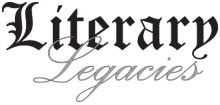 Edward Morgan Forster was novelist, short story writer and essayist.
He was born on 1st of January 1879 in London. His father Edward Morgan
Licwellyu Forster was an architect and died soon after his son was born.
His mother was Alice Clara Whichelo. Edward Morgan Forster was novelist, short story writer and essayist.
He was born on 1st of January 1879 in London. His father Edward Morgan
Licwellyu Forster was an architect and died soon after his son was born.
His mother was Alice Clara Whichelo.
After the death of his father young Edward was raised by his mother,
aunts and governesses. He started writing stories at the age of six. He
attended the Tonbridge school in Kent County, then went on to study
history, philosophy and literature at King’s College, Cambridge.
He received his Bachelor of Arts in 1900. Although his public school
years were unhappy at King’s he blossomed under tutors and the
atmosphere of intellectual freedom of Cambridge.
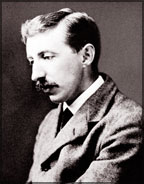
After coming into an inheritance from his Great Aunt Marianne
Thornton, Forster was off on his first of many trips to Europe with his
mother.They visited Italy then Greece where Forster first experienced
the Mediterranean culture he would grow to love and write about. When he
was not travelling he lived with his mother at Abinger Hammer in Surrey
until her death in 1944.
Forster knew early on he would be a writer and was fortunate enough
not to experience financial hardships. His first of many sketches,
essays and stories were printed in the Independent Review in 1904.
Later he contributed greatly to the London literary journal, The
Athenaeum . His first novel were Where Angels Fear to Tread , set in
Tuscony, was followed by his Bildungs roiman novel The longest Journey ,
Rickie Elliot being one of his most autobiographical characters. A Room
With a View was Forster’s next work, A Romance set in Italy, contrasted
with Edwordian England’s society and mores.
He is known best for his ironic and well-plotted novels examining
class difference and hypocrisy in early 20th century British society.
Forster’s two best-known works, A Passage to India and Howords End ,
explore the irreconcilability of class differences. Although considered
by some to have less serious literary weight, a Room with a view also
shows how questions of property and class can make connection difficult.
Forster is noted for his use of symbolism as a technique in his
novels, and he has been criticised for his attachment to mysticism.
Forster was deeply committed to numerous literary causes during his
lifetime including PEN, the international association of writers.
As an Hinery Fellow at Cambridge, he lectured there and was a
well-known and respected figure on campus. In 1953 he was awarded the
order of companions of Honours and in 1969 given Queen Elizabeth’s Order
of Merit.
Forster had five novels published in his lifetime. Forster’s views as
a secular humanist are at the heart of his work, which often depicts the
pursuit of personal connection in spite of the restrictions of
contemporary society.
His humanist attitude is expressed in the non-fictional essay What I
Believe .
Forster died on 7th June 1970 at the age of ninety.
Compiled By Ishara Mudugamuwa
[email protected]

To Marion

Lips closed shut
Eyes opened bright
With a drop of tear
Just to slip down your cheek
Regret or shame
Fear of fate
Courage for tomorrow
Understanding of life
All in one
You look sad
But recovered from guilt
The day you were a queen
Remember your fascinating smile
The beauty that never forgotten
In all and every heart witnessed
Storm has blown
Shattered is your life
Blame on you the worst
No one asks why
Forgotten the way the world is heading towards
Queen the de-crowned
You still take our hearts
Something within your eyes lit
Seems telling your mighty heart
Dasun Godapitiya
Either side of “Victory”
I stand straight
Chin held high
As I’m trained to do.
There goes the Captain,
Praising, appreciating,
My brave deed of destroying the enemy.
Some distance away, a woman wails-cursing
My crime of killing her man.
There’s my love, with our child,
Pride shining in her eyes.
Some distance away, a mother and a child-
Tears streaming down their eyes.
I step up, another piece of metal
Pinned to my green shirt.
A man stepped down, because of a metal,
Wearing a reddened shirt.
I halt, stand up straight,
Salute my Commander-in-Chief.
Some distance away, a woman doubles up
Paying last respect to her man.
Our flag is up; it flows in the wind,
Speaking of a triumph so great.
Another flag down, all are in black,
Speaking of a loss so great.
Minoli Wijetunga
A counsellor’s night
Long time ago
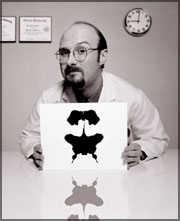
There was a period
Freud Piaget Watson were
Friends of mine.
It was an unforgettable season
From knowledge they gave
I recovered lot of minds
Causing breaks by waves of
Love Anger Jealousy Lust.
Inactive Insensitive creatures
To step on conscious land
But how cruel the time?
Beyond that how cruel is this night?
Among loneliness emptiness Who will offer
me Solutions from counselling.
Chameera Lasantha
Applications are invited
(Recommendation of a minister/ high rank, is a must)
Censored, fully shaved

Neatly dressed with a tie over the neck
Long sleeved white colour shirt
Mirror like glittering shoes
Educational, sports, experience certificates
Selected applicants in a queue
For an interview
Five members for the board of interview
Questions from here and there
Without expecting answers
Because the answer is already given
With the recommendation
Attached to the application
One was appointed with the best recommendation
Certificates, education, ability is nothing
But the recommendation is everything
Ajitha Perera
Lion’s Mission
The Lion for sixty years,
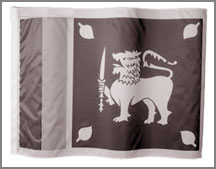
Having made observations
Contemplates its journey.
It feels the wryness of blood
On the field where it stands,
The sword is corroded, blunt
And carries no shine,
The four Bo leaves cry
Asking for a fresh wind
To refresh and reawaken.
The Lion roars
Being suffocated
For, the air it breathes
Is mingled with the
Smoke of terrorism.
The Lion is determined now
To wipe out this smoke
Enabling the red field to
Turn into blood of sweat,
Enabling the sword to
Regain its shine,
Enabling everyone to breathe
The air of peace
In this tiny independent Isle.
A. Jayalath Basnagoda
|
